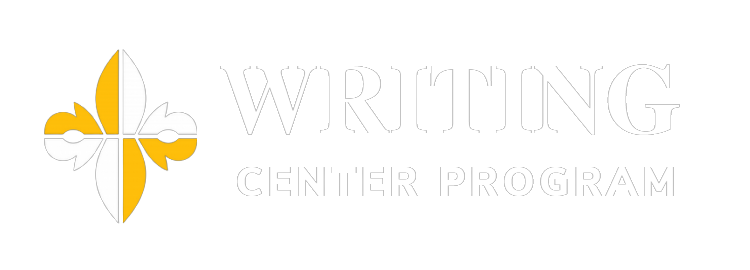The Writing Fellows Program
What Is the Writing Fellows Program?
The Undergraduate Writing Fellows Program brings together talented undergraduate writers and dedicated faculty members to improve student writing in a variety of disciplines and to establish a culture of writing and revision at Nazarbayev University. This three-semester fellowship prepares students across all majors to serve as undergraduate peer writing tutors, or Writing Fellows, who in turn work with other students to help them become better writers through dialog and collaboration.
This interactive approach to writing allows student writers to be active participants in their learning; with Writing Fellow support, they can identify areas where they need the most improvement in their writing and learn strategies to help them not only write better papers, but become strong, independent writers and learners.
All Writing Fellows are trained to write insightful and critically constructive comments, which they are able to do because they are careful, analytical readers. They are not TAs or substitutes for professors; while they may not have subject expertise, they are educated, inquisitive readers who can help student writers more clearly express their analysis, arguments, ideas, etc. Whereas student writers bring their content knowledge to the table, Writing Fellows bring their expertise in writing, thus creating a balanced, intellectual partnership of mutual learning.
This interactive approach to writing allows student writers to be active participants in their learning; with Writing Fellow support, they can identify areas where they need the most improvement in their writing and learn strategies to help them not only write better papers, but become strong, independent writers and learners.
All Writing Fellows are trained to write insightful and critically constructive comments, which they are able to do because they are careful, analytical readers. They are not TAs or substitutes for professors; while they may not have subject expertise, they are educated, inquisitive readers who can help student writers more clearly express their analysis, arguments, ideas, etc. Whereas student writers bring their content knowledge to the table, Writing Fellows bring their expertise in writing, thus creating a balanced, intellectual partnership of mutual learning.
When Writing Fellows collaborate with undergraduate student writers and faculty mentors, they uphold the university’s graduate attributes by becoming open-minded, thoughtful, and innovative communicators who are committed to social and ethical responsibilities as intellectual leaders.
How Can I Get Help from a Writing Fellow?
You can get help from a Writing Fellow if you are taking a class that has Writing Fellows embedded in the course. If you are taking such a course, your professor will announce the process of working with a Writing Fellow during the first week of class, and there will be a section in your course syllabus that details what you can expect when working with them.
You will also meet your Writing Fellows during the second week of class; they will introduce themselves to you and administer a brief survey to get to know you a bit better.
You will also meet your Writing Fellows during the second week of class; they will introduce themselves to you and administer a brief survey to get to know you a bit better.

What Is It Like to Work With a Writing Fellow?
What Are The Benefits
What Are The Benefits
A Collaborative Effort
If you have been assigned a Writing Fellow, you can anticipate a challenging, but wonderful learning experience through collaboration and inquiry. While it may seem like a daunting task to prepare two drafts of one assignment, you should not take your relationship with your Writing Fellow lightly. Rather, you can see it as an opportunity to exchange ideas. You will gain a deeper understanding of the course material as you discuss your arguments, and you can also expect to have the Writing Fellow help you develop writing strategies to communicate your ideas more clearly and effectively.
Understanding the Writing Fellow Approach
You should note that Writing Fellows may not be entirely familiar with your course content and materials, as they are not enrolled in the course. The purpose of this relationship is to ensure that you truly understand the ideas that you plan to discuss in your paper, and what you may perceive as passiveness on the part of the Writing Fellow is really their way of encouraging you to elaborate on your arguments.
Other Benefits
Working with a Writing Fellow will also help you with your time management and help you know more about your own writing process. Typically, by submitting two versions of the same assignment, you learn to break a larger task into manageable, workable parts - the first draft will require you to carefully organize and analyze your arguments, and the final draft will require you to revisit and polish your arguments for clarity and efficiency.
How Can I Become a Writing Fellow?
To become a Writing Fellow, simply enroll in the first course in the Writing Fellow sequence, WCS 390. Prospective Fellows will:
To help you understand the work you will do as a Writing Fellow as well as the requirements and procedures of the program, download the SSH Writing Fellow Program Orientation & Procedures below.
- Have passed WCS 150 (with a B or higher) and one of these courses:WCS 220, WCS 230, WCS 250 (with a B+ or higher grade).
- Have a strong interest in peer-support, collaborative learning, or mentoring.
- Have a desire to develop your own writing.
To help you understand the work you will do as a Writing Fellow as well as the requirements and procedures of the program, download the SSH Writing Fellow Program Orientation & Procedures below.
Program Structure
Learning and working as a Writing Fellow requires dedication, and perseverance.
Becoming a Fellow requires a 2-3 course commitment.
Becoming a Fellow requires a 2-3 course commitment.
WCS 390
This course prepares you for fellowship. In WCS 390, you will become familiar with different types of writing as well as contemporary Writing Center theory and pedagogical practices.
WCS 391
In this course you will be embedded in a writing intensive course. Here you will collaborate with professors to provide writing support for their students. You will also design and initiate an original research project to enrich your fellowship practice and contribute to the field.
WCS 392
If you would like to continue as a Senior Fellow, you can opt to enroll in a third semester of Writing Fellows, WCS 392. This course will provide you with a more in-depth exploration of the issues around knowledge construction and writing pedagogy as well as the extended opportunity to tutor student writers, write up your research for publication, and mentor first-year Writing Fellows.
WCS 393 & WCS 394: [Optional] Writing Fellows Internships
Students who have successfully completed WCS 392 are eligible to work as undergraduate peer tutors in the SSH Writing Center, thereby continuing the development of their skills through tutoring, collaboration, and reflective practice. Undergraduate tutors have the option of balancing their tutoring work with continued work on their Writing Fellows research projects toward the goal of publication.
Course Details

WCS 390: Writing Fellows I: (Composition and Collaboration in Theory and Practice)
This course provides first-year Writing Fellows with the theoretical and practical training to become a successful Writing Fellow at Nazarbayev University. You will explore and discuss topics related to becoming an effective writing tutor through critical inquiry of contemporary writing theories and observation of tutoring sessions. With this foundation, you will engage in collaborative peer tutoring to develop practical strategies to help you better understand the role of a tutor in a writing center. You will also develop an original research topic in writing pedagogy. In addition, you will cultivate an understanding of how information (articles and other sources) and identity come together to create a writer’s voice.
In addition to exploring theory and best practices, you will also learn to write critical and insightful reflection papers, literature reviews, and other genres of writing across disciplines
In addition to exploring theory and best practices, you will also learn to write critical and insightful reflection papers, literature reviews, and other genres of writing across disciplines

WCS 391: Writing Fellows II: (Practicum in Composition & Collaboration)
This course is a hands-on practicum that follows WCS 390, in which Writing Fellows explore and discuss contemporary writing theories and writing center and research. Through praxis and inquiry, Fellows will apply the knowledge they’ve gained in theory and research to help student writers in the Nazarbayev University community. Writing Fellows will serve as peer writing tutors for specific courses and will also participate in weekly seminar meetings to discuss their service and learning and to stay current on writing center research. In addition to tutoring, Writing Fellows will design and conduct original research, and submit a research paper documenting their project.
A final evaluation is based on a portfolio that includes the research paper, critical self-reflection of teaching practices, peer observations, mentoring faculty evaluations, and data-based analysis of teaching practice.
A final evaluation is based on a portfolio that includes the research paper, critical self-reflection of teaching practices, peer observations, mentoring faculty evaluations, and data-based analysis of teaching practice.

WCS 392: Writing Fellows III: (Research & Practice in Writing & Peer Mentorship)
This course is an optional, third portion of the Writing Fellows program. In this course, Writing Fellows explore how social context and different ideologies can influence the way people construct and express knowledge, which may lead to conflicts with what a community prioritizes in learning versus how they learn it. Writing Fellows brainstorm solutions to address these issues, and by doing so, they also investigate the more nuanced roles of being a peer mentor – how to work with students and faculty who expect help in ways that differ from the philosophy of the Writing Fellows Program.
This course provides two mentorship opportunities: the opportunity to continue working as a Writing Fellow embedded as a peer writing tutor in discipline courses as in WCS 391, and the opportunity to mentor new Writing Fellows in their first year of study and practice.
To enrich their knowledge of writing in the social sciences, Writing Fellows also analyze readings more carefully to examine how research design and research methodology come together to create a substantial contribution to the body of Writing Center research. Fellows will exercise this knowledge with the option of further developing their research topic from WCS 391, or beginning a new project.
This course provides two mentorship opportunities: the opportunity to continue working as a Writing Fellow embedded as a peer writing tutor in discipline courses as in WCS 391, and the opportunity to mentor new Writing Fellows in their first year of study and practice.
To enrich their knowledge of writing in the social sciences, Writing Fellows also analyze readings more carefully to examine how research design and research methodology come together to create a substantial contribution to the body of Writing Center research. Fellows will exercise this knowledge with the option of further developing their research topic from WCS 391, or beginning a new project.

[Optional] WCS 393 Internship: Undergraduate Writing Tutor I
Undergraduate tutors in the SSH Writing Center will serve as peer writing tutors to support NU students. Undergraduate tutors will be NU students in good standing who have successfully completed WCS 392 and are committed to continued development of their tutoring skills through tutoring, collaboration, and reflective practice. Undergraduate tutors have the option of balancing their tutoring work with continued work on their Writing Fellows research projects toward the goal of publication.
See the Full Overview 
[Optional] WCS 394 Internship: Undergraduate Writing Tutor II
Undergraduate tutors in the SSH Writing Center will serve as peer writing tutors to support NU students. Undergraduate tutors will be NU students in good standing who have successfully completed WCS 393 and are committed to continued development of their tutoring skills through tutoring, collaboration, and reflective practice. Undergraduate tutors have the option of balancing their tutoring work with continued work on their Writing Fellows research projects toward the goal of publication.
See the Full Overview For New & Current Fellows
Congratulations on becoming a Writing Fellow and welcome to the program!
The information found in this section will provide you with an understanding of the expectations and protocols that Writing Fellows should follow. You should also familiarize yourself with the Student Handbook.
Required Courses & Course Sequence:
All first-year Writing Fellows take two courses: WCS 390 and WCS 391.
The information found in this section will provide you with an understanding of the expectations and protocols that Writing Fellows should follow. You should also familiarize yourself with the Student Handbook.
Required Courses & Course Sequence:
All first-year Writing Fellows take two courses: WCS 390 and WCS 391.
- Both courses are required for you to participate as a Writing Fellow.
- Enrollment in WCS 390 is open to all students who meet the prerequisites for the course.
- Enrollment in the WCS 391 and WCS 392 is managed by the instructors of those courses.
- See a referenced timeline to complete the 3-course sequence in continuous semesters
The Writing Fellows Research Consortium
The Writing Fellows Research Consortium is student research presentations held at the end of every semester as part of course activities open to an extended audience. This event is an occasion for Writing Fellows–talented undergraduate writers enrolled in the second (WCS 391) and third (WCS 392) courses of the Writing Fellows Sequence–to share their research and receive feedback beyond the classroom.
All students enrolled in the sequence, Writing Fellow Interns, Writing Fellow alumni, all students and all faculties in the community are welcome. Fellows present work-in-progress research projects on a variety of research issues of interest in peer tutoring and writing center scholarship that they have been exploring from the perspective of our concrete and immediate context.
See the Spring 2025 Program
All students enrolled in the sequence, Writing Fellow Interns, Writing Fellow alumni, all students and all faculties in the community are welcome. Fellows present work-in-progress research projects on a variety of research issues of interest in peer tutoring and writing center scholarship that they have been exploring from the perspective of our concrete and immediate context.
See the Spring 2025 Program
The Writing Fellows Student Handbook
This handbook contains the philosophy of our sequence and explains the protocols and processes of being a Writing Fellow, from your first meeting with your professors to guides for commenting and conferencing with students.
You’ll find our principles and goals, expectations and checklists for each meeting, an explanation of how our sequence works, answers to frequently asked questions, and some samples of syllabi and other course material that will allow for you to easily incorporate and introduce Writing Fellows to your students.
You’ll find our principles and goals, expectations and checklists for each meeting, an explanation of how our sequence works, answers to frequently asked questions, and some samples of syllabi and other course material that will allow for you to easily incorporate and introduce Writing Fellows to your students.
For Additional Questions Contact:
- James (Jim) Swider)Writing Center Coordinator
WCP InstructorEMAIL: james.swider@nu.edu.kz
© 2023 Writing Center Program
Contact Info
+7 (7172) 69 48 12 -------- +7 (7172) 70 47 33
Kabanbay Batyr Avenue 53, Astana, Kazakhstan
